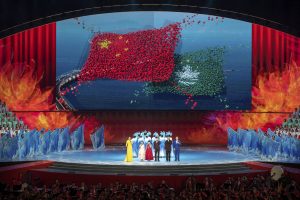Chinese President Xi Jinping heaped praise on Macau this week as part of celebrations of the 20th anniversary of the former Portuguese colony being handed over to Beijing’s control. Xi’s remarks, and comments from other top Chinese officials, were not only aimed at Macau, however – labeling Macau the golden child of “one country, two systems” is also a way of obliquely criticizing Hong Kong’s integration with the Chinese “motherland” (or lack thereof).
Speaking at a banquet ahead of the official anniversary of the Macau handover, Xi noted the fast economic growth of the special administrative region (SAR) over the past 20 years. That success, according to the Chinese president, “shall be attributed to the thorough implementation of [the] ‘one country, two systems’ principle…”
Xi elaborated on Macau’s embrace of the “one country, two systems model,” which he said included:
“Loving the motherland and loving Macau” becoming a core value of the whole community, the authority of the Constitution and the Basic Law being firmly upheld, the executive-led system functioning smoothly, Macau actively integrating itself into the national development, and social inclusiveness and harmony creating great power to unite the people of Macau.
Each of these points should be read as a stark contrast to Hong Kong, where protests against what is perceived as Beijing’s encroachment are well into their seventh month. In Beijing’s eyes, Hong Kong as a whole can be faulted for a lack of both “love” for “the motherland” and integration into China’s “national development” – and certainly for a lack of “social harmony.” Even Hong Kong’s local governance system cannot be said to be “functioning smoothly,” despite Xi’s recent show of support for Chief Executive Carrie Lam.
Macau’s Chief Executive Chui Sai On added his own interpretation of the root of Macau’s success: “The core is the accurately understanding and wholeheartedly upholding of the political system and core values of the country.” In other words, the uniqueness of Macau’s “system” is forever and always held subservient to the political interests of “one country” (or, more precisely, the Chinese Communist Party). And that is just what Beijing wants to see from Hong Kong. That is, in essence, when high-ranking officials such as Zhang Xiaoming, head of the Hong Kong and Macau Affairs Office, mean when they insist that “‘one country’ is the prerequisite and foundation for implementing ‘two systems.’”
Zhang, in an article for People’s Daily, summarized the conclusions reached on Hong Kong and Macau during the fourth plenary session of the CCP’s 19th Central Committee, held in early November 2019. One of the top conclusions was the need to “firmly establish a ‘one country’ consciousness, adhere to the ‘one country’ principle, earnestly safeguard national security, correctly grasp and manage relations between the Central Committee and the SAR, and absolutely not tolerate any behavior that challenges the bottom line of ‘one country, two systems.’” Hong Kong is singled out for special caution here because, as Zhang put it, Hong Kong’s political opposition parties, in league with “external forces,” have implemented “unrestrained attacks” on the central and SAR governments.
Macau, by contrast, is seen as a success story because its local governance has not challenged the overall rule of the CCP. One example of that, touted by Zhang, is Macau’s successful passage of national security legislation in accordance with Article 23 of the Basic Law. The Macau national security law, which took effect in 2009, outlaws treason, secession, and subversion as well as “preparatory acts” for the same. The crimes are punishable by up to 30 years in prison.
The Macau law is seen as an example for Hong Kong, where efforts to pass similar legislation were derailed by mass protests in 2003. Article 23 legislation in Hong Kong has not been formally taken up again since, but there are clear signs (including the conclusions reached at the fourth plenum) that Beijing wants to move in that direction once again. Zhang made it clear in his article that the lack of national security legislation in Hong Kong is seen as one of the important reasons that “radical separatist” activities have intensified over the past few years. Small wonder, then, that Beijing sees passing such legislations as an “urgent task” for the SAR government.
As a further sign of Beijing’s ambitions for Hong Kong, this week Xi made a point of touring a Macau school and highlighting his approval for “the patriotic education in Macau.”
“Patriotic education lays a solid social and political foundation for Macao to implement the ‘one country, two systems’ principle and guides its practice to always proceed in the correct direction,” Xi said, according to Xinhua. He also “praised Macau’s efforts to jointly compile textbooks with the mainland.”
Given that many of the Hong Kong protesters are students, Chinese officials have laid the blame for the movement largely on a lack of so-called “patriotic education.” A 2012 initiative to implement “moral and national education” in Hong Kong was widely criticized within the SAR as an attempt to quash academic freedom and implement propaganda instead. The backlash included a round of mass protests and the occupation of government headquarters; the education changes were then scrapped but the Hong Kong government has not given up on the idea entirely. Implementing some form of patriotic education in Hong Kong remains a key goal for Beijing. As Xi’s remarks suggested, a successful education campaign is seen as part of the reason Macau has not followed the same path as Hong Kong.
As formal celebrations of Macau’s handover continue Friday and beyond, it’s worth keeping an eye on what else Xi and his comrades have to say. Macau’s touted successes are clues to what Beijing has in mind for Hong Kong.

































